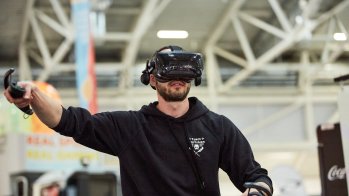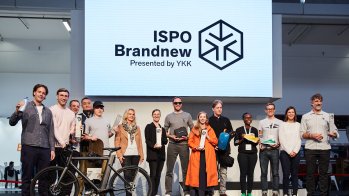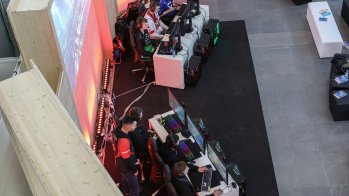
At ISPO Munich 2020, Schöffel prominently advertised its new, heated ski clothing over a large area. "I wish I'd had them during my time as a ski racer," two-time Olympic champion Benjamin Raich was quoted. Descente also presented a hybrid ski jacket at the world's largest platform of the sports industry, which not only warms artificially, but also supplies power to the smartphone while skiing.
"Whether heating, cooling, lighting or the measurement of bodily functions such as pulse - many innovations in the textile sector today come from technology. Over the last few years, this has also become much more evident at ISPO. The topic has reached the mainstream," said Dr. Klaus Hecker, Managing Director of the Organic and Printed Electronics Association (OE-A) in an interview with ISPO.com.
In the new Intellitex Heat System from Schöffel, a sensor in the ski jacket constantly checks the difference between the set temperature and the actual body temperature. If it gets too cold, there is a heat push into the carbon nanotubes of the jacket. The energy for the complete ski sets, which will be available this autumn for around 1,700 euros, comes from a classic power bank. Descente, on the other hand, relies on three removable solar cells for its Solar Thermo Insulated Jacket (expected to cost 1,850 euros), which will be available from October. With the help of sunlight, they provide either the energy for the ceramic heater integrated in the ski jacket or the power for mobile phones.
Last autumn, jeans legend Levi's, in collaboration with Google, had already launched an intelligent jacket on the market that allows you to control your mobile phone. A touch-sensitive strip on the jacket sleeve connects to the smartphone via Bluetooth. This allows you to take calls, send messages or start music without taking your mobile phone out of your pocket. Instead, only the jacket sleeve needs to be tapped.
However, these examples are only the tip of the iceberg when it comes to smart textiles. Whether the integration of light elements into clothing or rucksacks, mobile power supply by integrated solar cells on long hikes, so-called Moisture Management or the monitoring of bodily functions with integrated sensors - the implementation of many technical features into clothing has only just begun.
#becreative - The ISPO Munich 2020 in Pictures
Shoe manufacturer Under Armour, for example, built a chip into the sole of its new Hovr running shoe, which provides direct feedback on cadence via the "Map my Run" app. This allows you to make changes while you are still running. Sales in the wearables market are expected to increase from 52 billion dollars this year to 63 billion dollars in 2021. This indicates the enormous potential of smart textiles. Especially since the use of "printed electronics" in clothing makes the integration of technology smaller, more practical and more natural.
"There's no question that the potential market is huge. Now it's important to develop intelligent business models arising from this and bring together completely new players," said Klaus Hecker. At the ISPO Munich, for example, Tobias Meyer from the sensor specialist IEE expressed great interest in increasing cooperation with companies from the clothing and sports industry during his presentation. His company, coming from the automotive sector, sees a great future in smart clothing.
"This ranges from live information for amateur athletes to marketable products for professional football clubs. For example, you could share the running routes of celebrities with TV channels or fans or simply monitor their health - with an investment of 200 million euros, that makes economic sense for some footballers," said Meyer.
Klaus Hecker sees great opportunities for the sports industry if it opens up even more to technical innovation: "In the sports industry new, smart products can be implemented quickly because it operates in half-year cycles. The automotive sector or the medical industry are much more conservative because of complex approval procedures".
 SportsTechUnlocking the Future of Sports with AI
SportsTechUnlocking the Future of Sports with AI
- ISPO awards
- Mountain sports
- Bike
- Design
- Retail
- Fitness
- Health
- ISPO Job Market
- ISPO Munich
- ISPO Shanghai
- Running
- Brands
- Sustainability
- Olympia
- OutDoor
- Promotion
- Sports Business
- ISPO Textrends
- Triathlon
- Water sports
- Winter sports
- eSports
- SportsTech
- OutDoor by ISPO
- Heroes
- Transformation
- Sport Fashion
- Urban Culture
- Challenges of a CEO
- Trade fairs
- Sports
- Find the Balance
- Product reviews
- Newsletter Exclusive Area
- Magazine






















